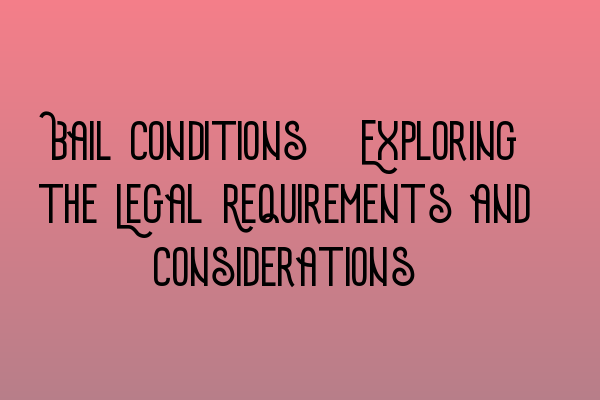Bail Conditions: Exploring the Legal Requirements and Considerations
Welcome to the SQE Criminal Law & Practice Law UK blog! In this informative article, we will delve into the world of bail conditions and explore their legal requirements and considerations. If you’re studying for the SQE 1 exam, this is a vital topic to understand. Let’s get started!
Understanding Bail in the Criminal Justice System
Bail plays a crucial role in the criminal justice system. It allows individuals charged with an offense to be released from custody while awaiting trial. However, to ensure the safety of society and the defendants’ appearance in court, bail conditions are imposed. These conditions are legally binding and must be adhered to throughout the bail period.
Before we dive deeper into the legal requirements and considerations, let’s briefly discuss the different types of bail conditions that may be imposed:
- Surety: This type of bail condition requires a third party to provide a financial guarantee for the defendant’s appearance in court.
- Residence: The defendant may be required to live at a specified address during the bail period.
- Reporting: Defendants may be required to regularly report to a police station or another designated location.
- Restraining: These conditions prohibit the defendant from contacting certain individuals or visiting specified places.
The Legal Requirements for Imposing Bail Conditions
When it comes to imposing bail conditions, several legal requirements must be met. The most significant consideration is whether the proposed bail conditions are necessary and proportionate in the circumstances of the case.
According to section 3 of the Bail Act 1976, the court must take several factors into account:
- The nature and seriousness of the offense
- The defendant’s character, antecedents, associations, and community ties
- The defendant’s previous record of complying with bail conditions
- The likelihood of the defendant interfering with witnesses or obstructing justice
To assess these factors, it is crucial to gather extensive evidence and present a compelling argument to the court. This is where the expertise of SQE Criminal Law & Practice Law UK solicitors shines. Our team has a deep understanding of bail law and can craft persuasive arguments to secure favorable bail conditions for our clients.
The Importance of Compliance with Bail Conditions
Once bail conditions are imposed, it is crucial for defendants to strictly adhere to them. Failure to do so can have severe consequences, including:
- Revocation of bail
- Issuance of arrest warrants
- Additional criminal charges for non-compliance
These consequences can seriously impact a defendant’s case and potentially lead to their re-incarceration. Therefore, compliance with bail conditions is of utmost importance.
If you or someone you know is facing criminal charges and requires legal assistance, don’t hesitate to contact SQE Criminal Law & Practice Law UK. Our experienced solicitors can provide expert advice and representation throughout the legal process.
Conclusion
Understanding the legal requirements and considerations surrounding bail conditions is essential for anyone studying criminal law. By comprehending the different types of bail conditions, the legal requirements for imposing them, and the importance of compliance, you are on your way to becoming well-versed in this crucial aspect of the criminal justice system.
For more information about the SQE exams or to explore other legal topics, check out our related articles:
- SQE 1 Practice Exam Questions
- SQE 1 Practice Mocks FLK1 FLK2
- SQE 2 Preparation Courses
- SQE 1 Preparation Courses
- SRA SQE Exam Dates
